“Back home down South, I could do no right.
When I moved out West, I could do no wrong.”
The quote is attributed to my late stepfather—a native Georgian who was light-skinned, green-eyed, and had a natural mane of wavy, reddish “Cab Calloway hair" that (according to him and which I don't doubt for a second) drove the ladies to distraction—on one of the rare occasions he spoke to me about the duality of his experience growing up bi-racial in the segregated Jim Crow America of the ‘40s and ‘50s.
It was typical of my stepdad, the quintessential “man of few words,” to capture the entire swath of his racial reality with such astute economy. When he was young, the inflexible Black-White binary of the segregated South disregarded his mixed ancestry. And though he self-identified as Black, how he presented didn’t fit the accepted (and arbitrary) stereotypical distinctions, so he was regarded with suspicion by Blacks and whites alike.
When he moved to the more integrated shores of California after the war, he discovered anew that how he self-identified was of little real consequence. Not with the ambiguity of his mixed-race appearance making him all things to all people. Integrationist whites, soothed by the familiarity of his European features, embraced him as the safe, “non-threatening” Black man. Among assimilationist Blacks, the toxic legacy of internalized colorism gave him his first taste of light-skin privilege as he was tagged socially as a matrimonial “catch” (“Imagine the beautiful, green-eyed, caramel-colored babies with ‘good’ hair we could have!”) while his white-adjacent appearance granted him unfettered access to professional and educational opportunities his dark-skinned colleagues were denied.
My stepfather's appearance and Scottish surname would have made it easy for him to pass, even if only on occasion of advantage, but he always claimed that to do so held no interest for him. Indeed, his rejection of his own white ancestry was so vehement (and never discussed) I always suspected it was linked to slavery and its heritage of rape.
The duality of experience born of the disparity between how one racially self-identifies and how one presents (and its emotional and psychological toll) is sensitively explored in Passing, the haunting debut feature film from director/screenwriter Rebecca Hall. Adapted from the 1929 book by Black female novelist Nella Larsen, Passing is a delicate, often heartbreakingly perceptive look at a very ugly American reality: the inherently corrosive nature of that illusory social construct we call race.
 |
| Tessa Thompson as Irene Westover-Redfield |
 |
| Andre Holland as Brian Redfield |
 |
| Alexander Skarsgard as John Bellew |
Passing examines the complex dynamic that develops between two women, former childhood friends, who renew their association years after their adult lives have taken them on very different paths. The intimate interplay of contrast, curiosity, envy, and attraction that filters through their relationship also sets the stage for an insightful study of the many subtle, and not-so-subtle ways race, class, identity, sexuality, gender roles, and colorism intersect in a society that relies on labels and classification to decide who is and who is not allowed access to rights and freedom.
“Definitions belong to the definers, not the defined.” - Toni Morrison (Beloved 1987)
A member of the Black bourgeoisie and a model of racial uplift, Irene Redfield (Tessa Thompson) lives in the affluent Sugar Hill district of Harlem with her physician husband and two children. She spends her days in charity work (The Negro Welfare League), doting on her sons, and imperiously overseeing her had-it-up-to-here-with-your-snooty-attitude housekeeper Zulena. Irene’s sense of self is linked to her class, her fastidiously ordered life ("Ginger-ale and three drops of Scotch. Scotch first, then the ice, then the ginger ale"), and in having a keen awareness of the “rightness” of things.
But like the ceiling directly above her bed, there are cracks in the perfect façade. For one, her husband Brian (André Holland) longs to uproot the family to Brazil (whose absence of segregation fueled a prevailing Harlem Renaissance-era myth of it being a racial democracy). While Irene, who sleeps a lot and suffers from migraines, is given to saying things like “I have everything I’ve ever wanted” with the kind of unwavering certainly found only in the truly dissatisfied.
Irene’s sense of self is also linked to her identity as a Black woman...or more to the point, her identity as a middle-class Black woman. But, unlike her dark-skinned husband and children who have no choice but to confront the day-to-day racism she would prefer not to dwell upon, she can pass as white and does so on occasion, only temporarily, “for the convenience.” It’s on just such an occasion—with Irene occupying a whites-only space while “disguised as a white woman”—that Clare (Ruth Negga), childhood acquaintance and fearless (reckless?) force of nature, reenters Irene’s life.
So many years have passed that it takes Irene some time to even recognize Clare. But Clare (in a cinematic moment my mind instantly branded as iconic) sees Irene immediately and knows her. The unselfconscious directness of Clare's gaze reveals volumes about the kind of woman she is and why such indomitable assurance makes her both appealing and a little bit frightening. An effortless charmer and flirt, upon their meeting, Clare is all breezy self-possession to Irene's reticent geniality.
Although to be fair, Irene is the one who has the most to unpack in trying to process Clare's casual disclosure that for the past 12 years she has been living as a white woman. The former Clare Kendry of Harlem, daughter of a college-educated apartment house janitor, has cast aside her Black identity and reinvented herself as Clare Bellew of Chicago, wealthy wife and mother married to a successful (and staunchly racist) banker (Alexander Skarsgård).
"Fancy meeting you here. It's simply too lucky!"
What Clare calls lucky is running into “Rene” at a time in her life when the gains of passing (security and an avoidance of the marginalization and violence of racism) are beginning to feel unequal to the cost (literal and figurative self-erasure). Eager to reconnect with the community and racial identity she thought she’d be happier without, Clare aggressively pursues a relationship with the cautious Irene. Meanwhile, Irene, who feels attracted and repelled by Clare in equal, internally confounding measure, is concerned about Clare’s apparent indifference to the dangers of the course she’s embarking on.
And from this arises one of Passing’s central dramatic conflicts: The woman who has everything she ever wanted (and will do anything to maintain that stability) meets the woman who gets everything she ever went after (and will do anything to secure it for herself). The presumptive tease of the film's title suggests that the Black woman passing for white is the one living a lie. But the film reveals there are many ways to live one's life inauthentically.
WHAT I LOVE ABOUT THIS FILM
I’d neither heard of nor read Nella Larsen’s book Passing before seeing Rebecca Hall’s exceptional film (the most accomplished first screenwriting/directing effort I’ve seen since Kasi Lemmons’ Eve’s Bayou - 1997). I found the film to be absolutely riveting from start to finish, my emotional stake in the fates of the characters and outcome of the story fairly turning the film into a nail-biting thriller. The threat of violence is so entrenched in America's perpetuation of the racial hierarchy that a story touching on the topic of Black autonomy and self-governance feels (a term repeated often in the film) not safe.
From its dominant Black female perspective to its tackling of queer themes and racial ambiguity, Passing is unlike any other film I've ever seen. So floored by it all, my reaction to Passing was so effusively enthusiastic that my partner (in an effort to get me to stop talking about it, I suspect) surprised me with a copy of Larsen’s novella that following day. I raced through it and emerged with even greater respect for the miracle that Hall and her talented collaborators achieved in bringing it to the screen. I feel it's a motion picture and topic that couldn't have been made as effectively at any other time in history. How remarkable that a book written almost 100 years ago feels as though it was written yesterday. I’ve since seen Passing a total of four times and I still can’t stop thinking about it. And I’m not sure I want to.
One obvious reason Passing keeps replaying itself over and over in my head is that it is such an extraordinarily beautiful film. The striking B&W cinematography by Eduard Grau (A Single Man – 2009) evocatively augments the film’s themes via images that poetically illuminate the many shades of gray that exist between the binary poles of black and white.
My fondness for films about women has been well-documented on these pages. Likewise, a sizable number of my most revered favorites have been movies exploring the dual nature of personality and the flexible margins of identity. Passing represents something of a jackpot on all fronts, not the least of its joys being that it’s that rarest of rarities, a movie about two Black women. Two Black women of intelligence, depth, and complexity whose actions propel the plot. Whose relationship exists independent of the male gaze and beyond a concern for the white gaze.
THE STUFF OF DREAMS
Passing's command of visual storytelling.
Passing is told from Irene's perspective. Whether it's the blurry fog we encounter when she's waking up from one of her many naps, or the admiring gaze cast Clare's way when she's not looking, the camera frequently provides insight into what Irene is feeling. The destabilizing effect Clare has on Irene is conveyed by showing events first as Irene sees them: the two images on the top and bottom left reflect Irene's internal certainty that her husband has succumbed to Clare's obvious charms. Then, as the events truly are: the top and bottom right images exhibit the spatial truth of the compressed mirror images that play tricks on Irene's eyes.
The Human Touch
(top l.) When Irene and Clare first meet in the tea room, Clare places her hand on Irene's, only to have her withdraw from Clare's touch.
(top r.) Sometime later at a dance, Irene lets her defenses down enough to access her attraction to Clare, and reaches out and holds her hand.
(bottom l.) Much later in their association, Irene's suppressed feelings and overall discomfiture are funneled into an unfocused fear of a loss, manifesting in an uncontrollable trembling in that same right hand.
(bottom r.) Irene's right hand - "What happened next, Irene Redfield never afterwards allowed herself to remember. Never clearly."
"I only had to break it and I was free of it forever."
Potted Plant Teapot
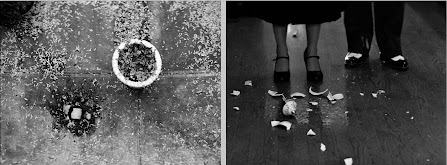 |
| Unsafe Irene Breaks Things |
Passing's bleak suggestion that for some, absolute destruction is preferable to having to confront a painful and inconvenient truth finds its correlative in America's current socio-political climate where normalized fascism reveals a country's willingness to destroy democracy rather than confront illusion-shattering truths about its history.
PERFORMANCES
My earlier comparison of Passing to Eve's Bayou doesn't stop with their shared brilliance and rare look at a side and condition of Black life rarely depicted in films. They also have in common the dubious (and maddening) distinction of being critically well-regarded films totally ignored by the Academy Awards. But when it comes to films made by women and films about the Black experience, unless the woman is a domestic or slave and/or her life is characterized by the spectacle of suffering and trauma, awards never really seem to tell the whole story, do they?
Both lead actresses give nuanced and memorable performances in Passing. If I had my way Ruth Negga would WIN the Oscar for that tea room scene alone. She is phenomenal. She owns that scene in a way that's almost criminal. She's that good. She imbues Clare with a catlike canniness that is a touching balance of steely self-possession and vulnerability. A clearly fun gal to hang out with, Clare is like a Black Southern Belle, all extravagant gestures and florid expressions, capturing every eye effortlessly.
The radiant Tessa Thompson gives what I think is her best performance to date in an increasingly impressive career. She does so much with her eyes! It's a marvel to me how she does it, but she makes clear Irene's most subtle feelings and thoughts, taking us in and helping us to understand a character who doesn't fully understand herself.
In interviews, Passing director Rebecca Hall often stated that one of the questions she wanted to explore through her film is: What is the emotional legacy and psychological toll of a life lived in hiding? I think the arresting and challenging Passing offers many very compelling answers. Better still, it inspires a great many more questions.
BONUS MATERIAL
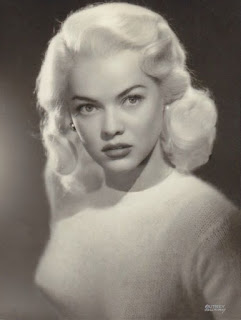 |
| Dona Drake (1914 - 1989) |
A fascinating tale of real-life “passing” can be found in the life story of one of my favorite screen supporting personalities. Dona Drake (nee Eunice Westmoreland), a Black, Florida-born actress, singer, dancer, and bandleader who passed for the entirety of her career. Though both parents were of Black ancestry, studio publicity declared Drake (who went by the names Una Villon, Rita Novella, Rita Shaw, and Rita Rio at various stages of her career) hailed from Mexico and was of French/Irish extraction. The beautiful and vivacious performer went on to be cast as "exotics" in a number of films throughout the '40s and '50s, principally as a musical-comedy performer, but occasionally given a dramatic role (she played Bette Davis’ Indigenous housekeeper in 1949's Beyond the Forest).
Another level of "passing" was added to Don Drake’s already fabricated biography when, in 1940, she wed gay costume designer William Travilla (Oscar and Emmy-winning designer of Valley of the Dolls and Marilyn Monroe fame) in what is believed to have been a mutually-beneficial, studio-arranged marriage. You can read more about Dona Drake’s life and career HERE.
Copyright © Ken Anderson 2009 - 2022
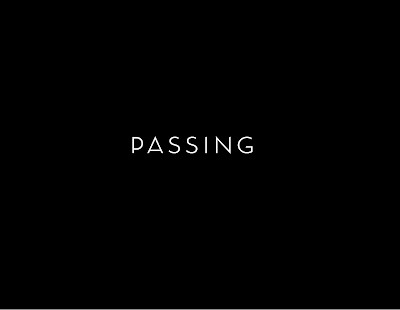





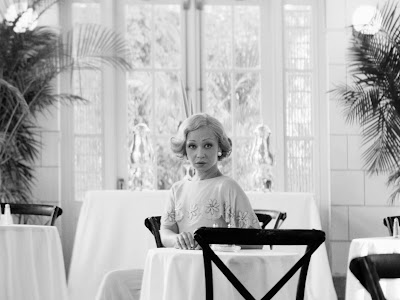
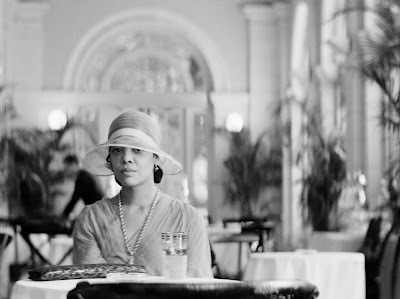





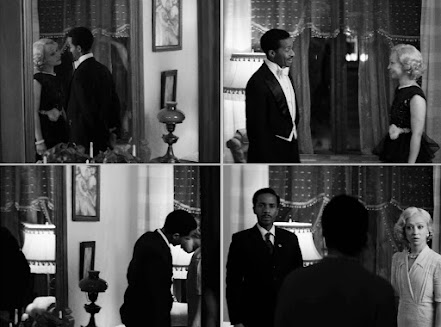



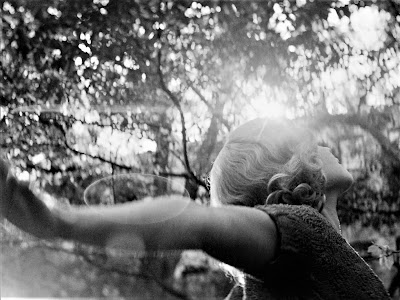
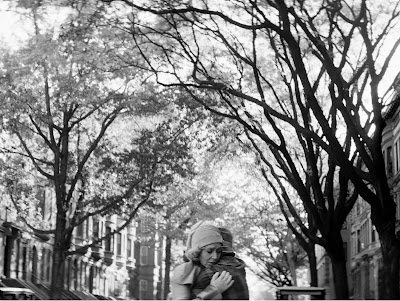


This film sounds fascinating and explores an issue definitely outside the realm of my experience (white boy growing up in the West). It reminds me of a movie I saw years ago called "Pinky" starring Jeanne Crain where she played a black woman passing for white (whether Crain is believable in this role or not, I'll leave for others to judge). In addition, I remember reading a review of a TV movie that dealt with the issue of skin color and its impact on status within an African-American community. It took some digging on IMDB but I came up with the name. It was called "The Wedding" and starred Halle Berry. I never saw the film but the issues it explored stayed with me despite forgetting almost all of the other details. I'd not heard of this film until now but I'll definitely try and watch it. Thanks for the review.
ReplyDeleteHello Ron
DeleteThanks for reading this! Yes, PASSING is indeed a fascinating film. Not the least of them being that the issue of race and passing is used to comment on society’s need to define and pigeonhole the human need to self-invent and live authentic to one’s nature. It’s especially relevant to current issues facing the trans and gay community.
I remember the film PINKY. I think it’s one of the earliest mainstream films to deal with the subject. I saw it only once, ages ago as a teen. Perhaps it's better than my memory indicates, but when I think back on it all I can recall is never being able to suspend my disbelief enough to see Jeanne Crain as anyone but Jeanne Crain. Far more persuasive was the 1934 version of IMITATION OF LIFE which featured light-skinned Black actress Fredi Washinton playing a woman who passes for white.
I never heard of the Halle Berry film THE WEDDING at all, but checked out the impressive cast on IMDB.
Thanks for providing readers with what I didn't have room for in my post: a the titles of a few like-themed movies to put PASSING into some historical context. Much appreciated!
Dear Ken: Hi!
ReplyDeleteWhat a fantastic essay! I've been wanting to see "Passing" ever since my sister raved about it. You have made it a must-see (guess I'll have to subscribe to Netflix!).
I don't recall you mentioning your step-father in one of your posts before. He sounds like a fascinating person who managed to keep a clear-headed perspective on some truly complex issues of personal identity.
Last year, I took an anti-racism course at my church, which involved reading several books and watching hours of documentaries about our nation's shameful racial history. What I hadn't understood until the course was that the concept of race didn't even exist as a legal, codified thing until the early 1600s and the rise of the international slave trade. So, of course, race was never intended to be a value-neutral descriptor. It always was intended to decide who was in and who was out, who had the power and who could be victimized and exploited. No wonder those in power today are fighting so fiercely to keep kids from learning about the real history of race ion our country!
As to "Passing" specifically, I will post again after I've had the chance to see the movie. But I'm looking forward to it, not least because, like you, I've become a real admirer of Tessa Thompson. I first saw her in the movie "Dear White People," in which she made a real impression on me. I saw her in "Selma," but I can't recall if she even had dialogue in that film or whether she was just "there" in various scenes. But I really loved her in "Sylvie's Love"--she held the center of that film like a true star does.
Like you, I also have a fondness for Dona Drake (although I was startled by the photo you posted above--I've never seen her with blonde hair before!). She had personality to spare as a musical performer; I recall her singing and dancing (and looking quite sexy!) in a guest spot in the war-era film "Star Spangled Rhythm." And she is adorable (and has a great wardrobe) as Eddie Bracken's girlfriend in "The Girl from Jones Beach" (a part I'm guessing she never would have gotten was it known she was a Black woman). I can only wonder how the strain and secrecy of Drake's years of "passing" might have contributed to the emotional and mental health problems she suffered in her later years.
Hi David
DeleteWow! With an opening like that you know you have my undivided attention. Ha! Seriously, I’m so glad if this piece encouraged you to see what was a #1 favorite film of 2021.
I’ve never written about my stepdad in such depth in a piece before, but he has popped up in many of my other essays, but always referred to as just Dad. The Dad who sat through THE BOY FRIEND because I begged him to take me. He was endlessly patient with the sometimes terrible films I finagled the family into seeing (Candice Bergen in Soldier Blue comes to mind). He was a terrific guy I never really thought of as stepdad nor did I call him that. He was more of a real Dad to me than my biological father. I only made a point of designating him as my stepdad to make clear that his mixed-race ancestry is not my own.
You’re right about how clear-headed he was about race and his own identity. In fact, looking back I see that his clear-headedness was one of his defining traits. Whenever I write about him like this, I always wish I took more opportunities when he was alive to tell him just how special he was to me and what an impression he made.
I am SO impressed that through your church you learned so much REAL Black history! The antiracism course you took sounds like what be a mandatory course for anyone entering politics. It also sounds just like the kind of course many states are trying to make illegal to teach.
You’ve contributed to the comments section immeasurably by providing this post with a succinctly summed-up account of the history of the construct of race that is the ideal addendum to this essay and this film.
And isn’t Tessa Thompson an actress to watch? I first saw her in Tyler Perry’s so-so adaptation of FOR COLORED GIRLS, but I fell in love with her in WESTWORLD, ANNIHILATION, and SYLVIE'S LOVE. And if you never saw her in the Janelle Monáe music video “Make Me Feel,” I highly recommend her.
This is my frst time seeing Ruth Negga in a film and she is…wow. Talk about star quality.
I’m thrilled you’re familiar with Dona Drake (but I should have known what with knowledge of classic musicals). I enjoyed her in movies as a kid and only learned of her Black ancestry as an adult. She is such a dynamic screen presence and talented entertainer. I can’t imagine that kind of secret-keeping combined with the desire to be world-famous as an actress. It seems like inviting scrutiny. That’s the kind of dangerous path Clare in PASSING would embark upon.
Nice hearing from you David, and thanks for the informative and thoughtful contribution of your comment!
Ken! Your posts are always thoughtful and thought-provoking but I daresay this is one of your best. Appropriate for such a special, beautiful, and important film, as delicately bold as it is boldly delicate. Dreamlike yet deep. Definitely a new favorite.
ReplyDeleteAw, thank you very much. Isn't this the most remarkable film? You express very well the impression PASSING made on you. I especially like the descriptor "delicately bold as it is boldly delicate," as it sums up what feels like the director's understanding of the fragile, human side of the mental, psychological, & emotional brutality of the dueling forces of repression and oppression.
DeleteYou come away from the movie not being quite sure how they did it without didacticism, preachiness, or stridency. It's a marvel and a very beautiful film. I'm glad to hear it's become a new favorite of your, as well.
Thanks for reading my post and commenting so graciously and with such sincerity.
Dear Ken: Eric and I watched "Passing" last night, and--wow!! You certainly did not oversell it in your essay! It is one of the richest, most complex and disturbing films I've seen for years. It reminded me of some of the late 1960s/early 1970s films I've seen ("The Swimmer," "Loving," "The Sterile Cuckoo") that really feel more like novels than films due to their richness of subject-matter and their ambiguity, carefully avoiding spelling things out and making things "neat" for audiences.
ReplyDeleteThere were so many striking themes in "Passing," but one that really stood out for me was the futility of Irene trying to live a "safe" life. She fears that Claire's passing with her husband is "not safe," she tries to shield her sons from discussions of racism (even as one of the boys comes home upset from being called "the N word"), and she spends a great deal of time sleeping (and it is suggested, perhaps abuses medication) as a way to escape daily trauma and stress. But ultimately, there is no way to stay "safe" and to be untouched by the evil and violence of the world.
I agree with you that the film is absolutely gorgeous to look at (and it also managed to disguise very cleverly what probably was a criminally small budget). And the performances were superb, form Thompson, Holland, and especially Negga. I just loved listening to Negga's fascinating voice! (My sister almost managed to see Negga as Lady Macbeth on Broadway yesterday, but the production had to be cancelled because star Daniel Craig was diagnosed with Covid!)
I also agree with you that a film as rich and deep as "Passing" could not have been made in the time the novel was written. Still, if the novel had been filmed in the 1930s, I like your idea of casting Fredi Washington (I see her as Claire). My suggestion for casting Irene would be actress Theresa Harris--are you familiar with her? Perhaps her best-known role today is as Barbara Stanwyck's friend in "Baby Face." But Harris had a long career, sadly almost always playing maids or a member of a dancing chorus (she danced in the Ethel Merman "High and Low" number from "Strike Me Pink.") For me, Harris' innate intelligence and talent always shine through no matter how small the role she played; one of my favorites is her role as Rosalind Russell's personal assistant (she definitely seemed like more than a maid) in the thriller "The Velvet Touch."
Hi David-
DeleteI’m so thrilled you and Eric got around to seeing PASSING and enjoyed it so much. In fact, from the insights and observations you share, I’d say your experience went beyond mere enjoyment of it. All you relay about Irene’s fear of being “unsafe” is so keenly observed, I’d say you really experienced the film, from its themes, characters, and, conflicts. I especially liked your sharp take on Irene and her need to feel safe (I hadn’t thought about her abusing her sleep medication! I think that is genuinely alluded to) and fondness for Ruth Negga and that instrument of a voice of hers.
(So criminal she didn’t get nominated for an Oscar, but in hindsight…she was spared a mess)
Like you, I feel the film shared a lot of qualities with so many of the same era - late 1960s/early 1970s – that I love. An intelligent, thoughtful movie that does indeed feel like a novel.
Your fantasy casting for a 1930’s PASSING is so spot on it makes my head hurt. I am thoroughly familiar with the beautiful Theresa Harris, but not so much that she crossed my mind as then absolutely ideal Irene. Fredi Washington as Claire and Theresa Harris (she has the right aristocratic bearing) as Irene is right on the money, David. Brilliant casting there.
I remember seeing online ads for that Broadway production of MACBETH and I thought that with that cast, it sounded like a must-see for anyone in NYC ( by the way, I have flipped over the Denzel Washington film…another visually stunning modern masterpiece). I would have been VERY put out having the production canceled. Especially given how long lovers of theater have had to wait for the shows to resume.
However, I suspect your sister handled her disappointment with grace despite my knowing how she must have looked forward to it given what you’ve told me about how much she liked PASSING.
So appreciate your coming back here to offer up a follow-up to your earlier comment. I’m happy that the film was such a rich experience, feeling selfishly grateful that my blog gets the benefit of your always absorbing and sensitive insights.
You've really done this wonderful film great justice with such incisive takes on the many branches the film extends, Ken. It's always gratifying when a truly intelligent film elicits a truly intelligent response.
ReplyDeleteI really warmed to Irene, and what you've showcased with subtitle ("we're all of us passing for something or other") is to me an absolute statement in both truth and eternal timeliness. It really addresses so much of what's thrown at us as the drums of "identity" get louder with each passing day but with little focus on the realities and frailties of the human condition itself.
I'll always love "Passing" - it's months since I saw it but it's found a permanent place in my heart & it seems like you're on to this very good thing as well!
Hi Rick! I'm glad you found the themes of this thoughtful and sensitive film to be as intriguing as I did. Irene is a remarkable fictional character, isn't she? So complex, and the one character going through the broadest arc of change and self confrontation in the movie. And as you note, the timeliness of a film that broaches the topic of identity and the many ways it can be defined, assigned, assumed, and misread, is matched only by its eternal truthfulness as well.
DeleteI'm pleased to know you responded to the film, and of course I'm flattered you read this post and so generously contributed your thoughts and kind words. Hope all is well with you. And here's to unearthing more modern favorites. Man cannot like by '70s alone (I'm slow in discovering!)